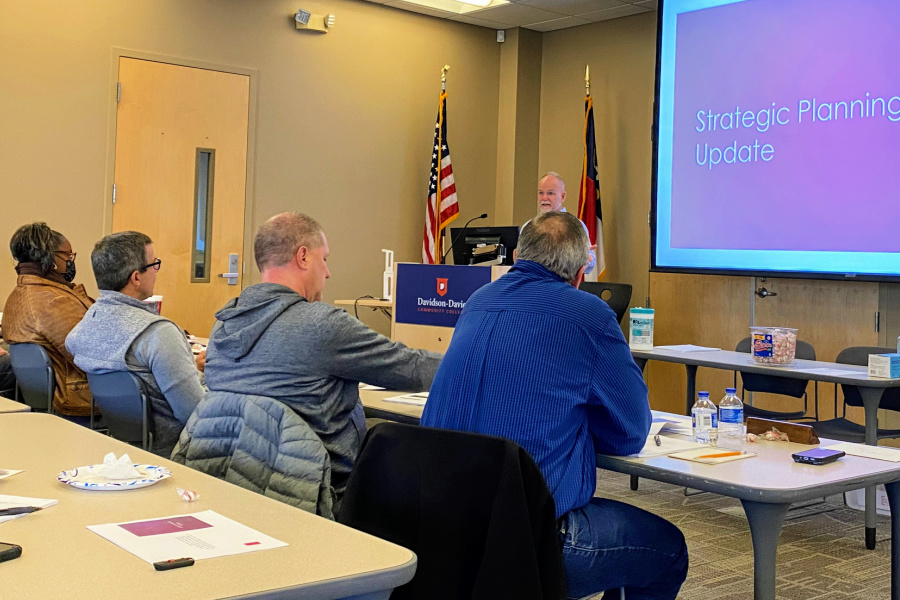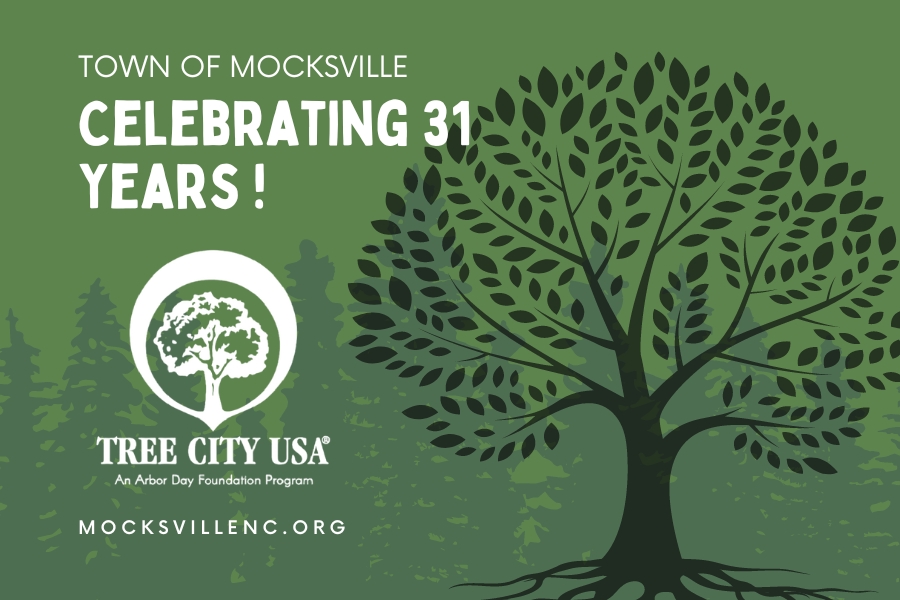
The Mac Frampton Trio at Brock Performing Arts Center – Tickets Available Now!
February 17, 2022
David Bone Resigns as Davie County Manager
February 28, 2022Town of Mocksville Kicks off 2022-2023 Budget Process

“Where there is no vision, the people perish,” said Mocksville Town Manager Ken Gamble, quoting Proverbs, as he kicked off the town’s strategic planning and budget retreat this month at the Davidson-Davie Community College. “Today we will be talking about the numbers and how to best utilize the resources that we have.”
The half-day meeting was designed to give the town board and staff the opportunity to discuss the challenges and needs facing the town during the coming year and to look at the big picture before making specific decisions about how to allocate resources.
Fortified by coffee, biscuits, and doughnut holes, Town Board members listened to presentations from Gamble, economic development, the town’s engineer, and the heads of each department. Although the public was invited to attend the retreat, no one took advantage of the opportunity. Following is an overview of the meeting so that Mocksville residents will have a better understanding of the budget process.

Economic Development – Where We’ve Been, Where We Are, and Where We Are Going
The presentations began with an economic development overview from Terry Bralley, president of Davie County Economic Development. In his introduction, Gamble remarked that the success Mocksville is experiencing doesn’t happen by accident. “It happens because of the things you did five, 10, 15 years ago. Terry is going to give us an overview of where we’ve been, where we are now, and where we are going because it is important that we understand this so that we aren’t thinking in a year to year mindset but a three to five-year mindset on our strategic thinking.”
Bralley explained that the basic building block for economic development is infrastructure. “Investing in infrastructure creates jobs, it creates opportunities for families, and it creates the tax base that is here. He shared that when he came to Mocksville in 1979, the tax rate was .50 per $100 valuation. Today it is .29. “Do you know why? You grew the tax base.”
He shared that Mocksville has a great reputation in the state of North Carolina for winning deals. “You’ve had a banner year with 550 new jobs and $100 million added to the tax base. Economic development is an investment in your own future. It is one of the few departments that you are paying that will pay you back.” Bralley provided an update about new spec buildings being built within the next year.
He also pointed out the town’s desperate need for housing. “We need young people. We need people moving to this community to take these jobs. He detailed new housing starts and said that they would help drive retail, which is also on the rise.

Water and Wastewater Capital Improvement Plan
The next presentation was aptly about infrastructure. Chuck Willis, Willis Engineers, who serves as the town’s engineer shared what he calls “the road map he uses to try to stay ahead of Bralley’s economic development.”
Utilizing maps, he explained the town’s water and wastewater Capital Improvement Plan (CIP) which details larger projects to be implemented over the next ten years. The plan is generally updated annually as part of the town’s budget process.
Currently, there are several CIP projects underway, including a new pump station and force main to convey wastewater from the Leonard Creek Drainage Basin and the newly expanded Brakebush Brothers Chicken Plant. These facilities will move wastewater from the town’s Dutchman’s Creek Wastewater Treatment Plant to the Davie County-owned Treatment Plant in Cooleemee, creating additional capacity for future development on the north part of Mocksville. Improvements will also include the renovation of an existing pump station and an additional water line to improve service to customers on the south side of town. Also underway, is a project to replace some of the pumping equipment at the Dutchman’s Creek Wastewater Treatment Plant.
He explained that future projects will concentrate on improvements to the water and sewer facilities north of Interstate 40 to allow for continued growth in that area. Those facilities will likely include a new elevated storage tank, water pipelines, and replacement of an aging pump station and force main. Over the next few months, the town board will be considering the details of these projects and will adopt an updated CIP. The town will continue to work with Davie County and the Davie County Economic Development Commission to pursue grant and low-interest low funding for these projects.
Willis addressed supply chain issues and the dramatic 30% to 40% increase in costs over the past two years, saying, “The struggle you will face in accomplishing these projects will always be money. Some projects will have grant funds attached to them but many will not. It will be difficult on Ken’s (Gamble) and Brian’s (Moore, public works director) part to determine what these projects will cost operationally and how to pay for them and build a long-term financial plan.”

Modified Zero-based Budgeting Approach
Before each department presented its budget needs, Gamble told the board that the town was utilizing a modified zero-based budgeting approach in which department heads examined each line item in order to identify underutilized resources.
He explained that the leadership team looked at the previous three years to capture trends in expenditures over time. They looked for line items that were consistently underspent and could be reduced and the funds reallocated; line items that were artificially high because of one-year expenditures, such as equipment needs and could be readjusted; old cost assumptions for services that might need to be adjusted up or down to reflect current prices; and retiring debt payments that would open up funds for other payments.
“I told my leadership team that available funds would go to the greatest need. Funds don’t belong to any particular department. They belong to the town and we have to look at them as an overall resource for the good of the town and its priorities. This is a team effort. Together we are talking about how we reduce or increase these line items and take whatever we have left over and use those resources first when we are looking at what we need for the community before thinking about raising the tax rate to pay for things.”
Mocksville Water Treatment Plant
Justin Turbyfill, who serves as the water plant manager through Envirolink, presented the capital improvement needs of the Mocksville water treatment plant (WTP) broken down by priority ranging from critical needs to recommendations that would improve efficiency and save energy. The most critical need was the replacement of an aged piece of equipment that would reduce the WTP’s operating capacity to 50% if it stopped working.
He also shared that Mocksville’s Hugh A. Lagle Water Treatment Plant had received an AWOP (Area Wide Optimization Program) Award in 2020 for demonstrating outstanding turbidity removal, a key test of drinking water quality. This award is given to systems that met performance goals significantly more stringent than state and federal standards. Awards for 2021 will be distributed this year.

Administration
Stating that a goal without a plan is just a wish, Finance Director Lynn Trivette shared the administration department’s five-year employee development plan which focuses on professional training, coaching, cross-training, and relationship skill-building. “Setting my staff up for success in their roles starts with giving them all the tools and resources they need to do their jobs well.”
She then detailed recent updates including new accounting software, an updated phone system, computer upgrades, and a customer web portal that allows residents to make payments or reservations online. Future needs include video conferencing, a smart meeting room, fire department technology improvements, staff security training, and new security cameras for Rich Park that would stream directly to the sheriff’s office.
Trivette ended by explaining the capital improvement plan for maintaining Town Hall in addition to routine maintenance. Last year, a new HVAC system was installed. This year Town Hall needs a new roof and pavers. Future plans include windows and bathroom remodeling.
Human Resources
Emily Quance, human resources specialist, shared what the Town of Mocksville is doing to select, train, motivate, and keep employees.
She reported that it is currently very difficult to recruit employees, pointing out that there has been an open position in the public works department for the past two years. To attract motivated and hard-working employees, Quance explained that the Town must develop fair pay and compensation, career development and advancement opportunities, and invest in employees through training and coaching. The town is currently conducting a pay study, which happens every five years, that is looking at employee development, developmental pay, performance (merit) increases, cost of living adjustments, and employee benefits.
Community Development
Community Development Coordinator Tami Langdon proposed a series of capital improvements to enhance the downtown area and attract visitors. “I feel so blessed to have the type of downtown that we now have and would like to see it continue to grow.”
- Wayfaring Signs – These included wayfinding signs which would promote and direct the public to key destinations within the Town and County like Rich Park, the visitor center, the downtown shopping district, and the Brock Performing Arts Center.
- Updating South Main Street Streetscape – with benches, planters, tree grates, and Forest Pansy Redbud trees.
- Permanent Farmer’s Market – at the old police station to also include a certified kitchen, pop-up market, and a part-time restaurant serving food from the market.
- Permanent Outdoor Theater and Stage at Main Street Park –
- East Depot Street Revitalization – decorative light poles, promote facade grants, and a small park/picnic area at the corner of Pine Street and East Depot Street.
- Parking – at the old police station and Horn Street.
- Electric Car Charging Station – in the parking lot at the old police station.
- Third Phase of Main Street Park – small kid-friendly play area that could be utilized during the farmer’s market and events at the park.
- North Main Street Sidewalk Improvements
Following the morning presentations, the Board and Leadership Team took a tour of the Mocksville Fire Department and the Public Works facility. During the tour, they looked at the old equipment owned by the Mocksville Fire Department, Public Works, and Parks & Grounds to gain a better understanding of their current and future needs.

Mocksville Fire Department
During a working lunch, Chief Frank Carter shared the fire department’s capital and operational budget requests.
He reported that the MFD had applied for a SAFER Grant (Staffing for Adequate Fire and Emergency Response) from FEMA designed to provide financial assistance to help fire departments increase their cadre of frontline firefighters or to rehire firefighters that have been laid off, and to recruit and/or retain volunteer firefighters. The request was for six full-time positions working a 24 on 48 off rotation. Each shift would then be manned by two 2 full-time firefighters and current part-time staff. Carter’s daily staff goal is a maximum of 6 and a minimum of 3 firefighters which would allow for an engine and ladder to be staffed 24/7.
Carter also detailed the department’s current capital and operational equipment needs such as turn-out and hazmat gear, breathing apparatus, rescue equipment, and a squad truck. The fire station also requires several upfits and improvements. Future needs include a newer used engine, and land for and construction of a second station to adjust for growth on the north end of town and to maintain response times.
The department would also like to provide a small pension for volunteers who retire with more than 20 years of service.

Parks & Grounds
Chris Vaughn detailed Parks & Grounds’ current needs, sharing photos of the old equipment and proposed replacements:
- Kubota R640 Wheel Loader to replace the current skid loader that continues to break down during operation and to address operational safety concerns. The skid loader does not have a door or covering to protect the operator from debris and has limited visibility to the rear and sides of the machine. The new machine would offer higher lifting height, greater lifting capacity, faster ground speed, is easier on turf and provides the operator with better visibility and safety.
- Kubota RTV-Xll20D Utility Vehicle to replace the 2013 model that is showing early signs of transmission failure and needs a new dump bed.
- Baseball Field Fence at Rich Park needs to be replaced because sections of the old fence are broken and bent, posts are beginning to rust, and gates will not fully close.
Vaughn ended his presentation by explaining the department’s future needs and proposed a timeline for the purchase of a Sand Pro 3040 infield machine, leaf truck, softball field lighting, and paving the entrance road to the softball field.
Public Works
Public Works also needs to replace equipment this coming budget year. Director Brian Moore’s presentation included three items: a 1994 service truck that is costing more than average to maintain and operate, a 1983 Ford utility tractor that provides little protection for the operator when clearing sewer lines, snow, and completing other jobs, and an equipment trailer that the department has had to re-weld the spring hangers for the axles and other frame supports and is difficult to load and unload with equipment.
Moore also discussed the need to have employees get certified in wastewater collections and water distribution following the retirement of the department’s certified employee. Moore and another employee are currently pursuing certification so that the town will no longer need to pay the county to provide that service.
Gamble commented on the importance of building capacity within the town’s staff, saying “It’s super important for us to look at these things and understand that if we don’t have the internal capacity we are going to have to pay for it, so building our staff up is one of the long-term goals that we have. If we aren’t investing in our staff, we are going to pay for that at some point, whether it’s on-the-job injury, a higher ISO rating, or paying other people to carry our certifications. When we ask for money to invest in staff, that is money well-spent.”

Projects to Finish Out the 2021-2022 Budget Year
Gamble shared updates about the projects that will be completed before the end of the current budget year: Horn Street parking lot improvements, Mando Field concession stand remodeling, board room redesign, and relocating the farmer’s market.
He ended the budget retreat by sharing the schedule for the rest of the budget process, saying, “We are going to work together to make sure that we are doing what is best for the community. This budget is going to leverage our resources and partnerships to the fullest extent possible.”
- 1st Draft to Commissioners and Department Heads – February 25th
- Public Budget Meeting – Address Items Cut – March 1
- 2nd Draft to Commissioners and Department Heads – March 28th
- Public Budget Meeting – Adjustments and Corrections – April 5th
- 3rd Draft to Commissioners and Department Heads – April 25th
- Public Budget Meeting – Budget and Budget Message – May 3rd
- Budget Available for Public Inspection – May 4th
- Public Hearing – Adopt Budget Ordinance – June 7th
Gamble and the Town Board encourage the community to attend the public budget meetings.





